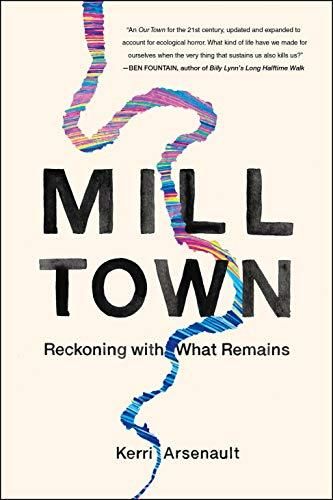Award-winning bestseller Kerri Arsenault reveals the slow destruction of her hometown at the hands of its sole industry, a polluting paper mill.

Deadly Water
Kerri Arsenault – book review editor at Orion magazine and contributing editor at The Literary Hub – grew up in Mexico, Maine and foresaw a bleak future as the area’s working-class towns went into decline, along with the factories that had fueled them. Arsenault learned that her state’s beautiful waterways hid lives ravaged by disease, ecological ruin, political denial and intrigue, all centered around pollutants from a nearby paper mill. She offers a searing family memoir of how industrial polluters exploit working-class families like hers.
The book won the Rachel Carson Environmental Book Award, and was a finalist for the 2020 National Book Critics John Leonard Prize for Best First Book and the 2021 New England Society Book Award. O Magazine selected it as one of the Best Books of Fall 2020. People Magazine explained, “Arsenault combines memoir with investigative journalism.” And, The Boston Globe wrote, “With affection and concern, Mill Town recounts Maine’s constant conundrum, an American story, a human predicament.”
Mexico, Maine
Arsenault sets the scene: Mexico, Maine sits among the hills, forests and rivers near Rumford, Maine at the bend of the Androscoggin River, where, as she reports, a paper mill’s smokestacks belch foul-smelling chemical waste.
The author recounts that her father, grandfather and many local families’ patriarchs, worked at the mill. She tallies the damage the mill wrought: She mourns that it polluted the land and the river’s water, resulting in diseases that killed many locals.
What none of us foresaw, however, as we marched down these roads not taken by our parents, is that leaving home can be as complicated as living there and as inescapable as our own DNA.Kerri Arsenault
Arsenault went back to Mexico in 2009 for her grandfather’s funeral and found the town changed. She makes the case that as digital technology supplanted printing, demand for paper dropped, jeopardizing people’s jobs at the paper mill. Her mother told her that if the mill closed, the town would be desolate.
Cancer
Arsenault learned that her late grandfather, who had worked in the bleach room at the mill, had died of stomach cancer. She breaks down the cycle of people working in the mill who grew ill and died of cancer, whether they were young, elderly, sickly or otherwise healthy. The town doctor, Edward “Doc” Martin, thought he had figured out why, but Arsenault chronicles how local forces suppressed him.
She relates that the doctor learned in 1981 that the local hospital had nearly twice the American national average of patients with prostate and colon cancer, and substantially higher rates for cervical and pancreatic cancer. Arsenault tracks Dr. Martin’s progress in showing the report to hospital authorities – but, she reports with dismay, they dismissed his claims.
Then, she divulges, in 1985, the Environmental Protection Agency (EPA) alerted the Department of Environmental Protection (DEP) that fish near Maine’s paper mills contained dioxin, a byproduct of burning mill waste and of the mills’ bleaching processes.
The mill suggested there could have been another source. The tests proved nothing, they argued. The DEP ultimately agreed. Kerri Arsenault
The author learned that Dr. Martin suspected that dioxin was causing the local cancer epidemic. He wrote editorials and exhorted federal, state and local authorities to halt the pollution. Locals shunned him and, Arsenault relates, the Rumford hospital barred him.
Over time, Doc Martin regained his patients’ trust because, as Arsenault clarifies, many came to understand that the mill’s practices caused their diseases. The author uncovers many shocking episodes. One man told Martin that his boss ordered him to bury waste full of mercury on the river’s banks. Another recounted how bosses ordered workers to fill dumpsters with drums of hazardous, toxic substances.
People who worked in the mill, Arsenault stresses, didn’t want to lose their jobs. The mill filed request with the DEP asking to be allowed to increase emissions significantly. Arsenault reports with horror that the town’s politicians, mill managers and environmental experts asserted that the mill could do whatever it wanted.
With high moral outrage, the author depicts how the director of the Maine Cancer Registry said the region’s high cancer incidence resulted from a lack of education, low income and unemployment – and never blamed mill pollutants.
Past and Present
One of Arsenault’s strongest themes is how the present and the past circle one another.
It seems the less you have – in education, money, health insurance or work, as the article cites – the more you are willing to endure.Kerri Arsenault
She laments that people who can’t afford to move away from Mexico and Rumford bear the worst consequences of polluted water and land. But, tragically, the author believes locals would rather not embrace the truth, and prefer to believe the lie that there’s nothing toxic in their drinking water or coursing through their bodies.
Tragedy
Arsenault never hides her profound ambivalence about her hometown and how glad she was to escape it. She eloquently depicts herself as unwillingly drawn back only because she glimpsed the absolute devastation the mill was wreaking on residents and – in contrast – their absolute denial that it was happening. In focusing on Mexico, Arsenault provides a blistering, revealing, groundbreaking portrait of small-town industrial pollution across America and worldwide, and of the political, economic and social forces that work to obscure pollution’s effects.
Our geologic past foretold everything about our future. But in this future, lives are un-lived, secrets never revealed and stories remain unwritten.Kerri Arsenault
Though never polemical, Arsenault paints this tragedy vividly and casts the blame and responsibility precisely where it belongs. A masterpiece of heartfelt reporting, Arsenault’s personal saga will appeal to environmentalists, activists, industrial workers and anyone concerned over the future of clean water.
Other insightful works on the plight of the working class in small-town America include Michael G. Hillard’s Shredding Paper: The Rise and Fall of Maine’s Mighty Paper Industry, Brian Alexander’s The Hospital: Life, Death and Dollars in a Small American Town, Dr. William Cooke’s Canary in the Coal Mine: A Forgotten Rural Community, a Hidden Epidemic, and a Lone Doctor Battling for the Life, Health, and Soul of the People, and Nicholas Kristof and Sheryl WuDunn’s Tightrope: Americans Reaching for Hope.








